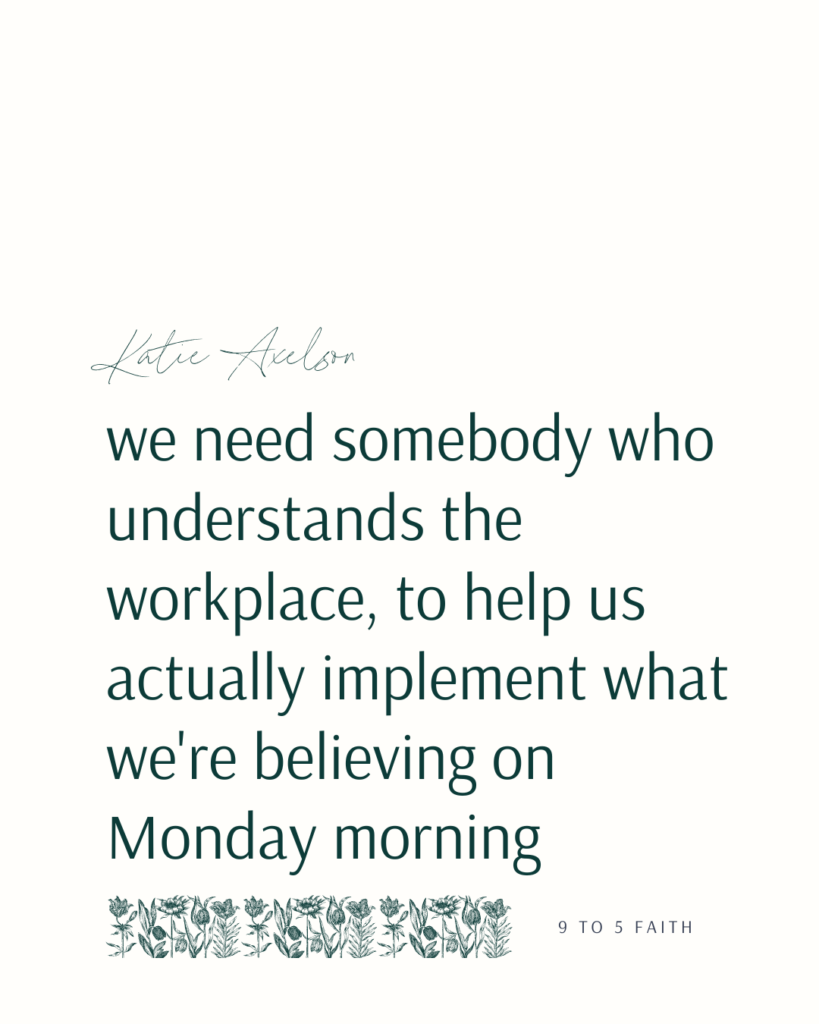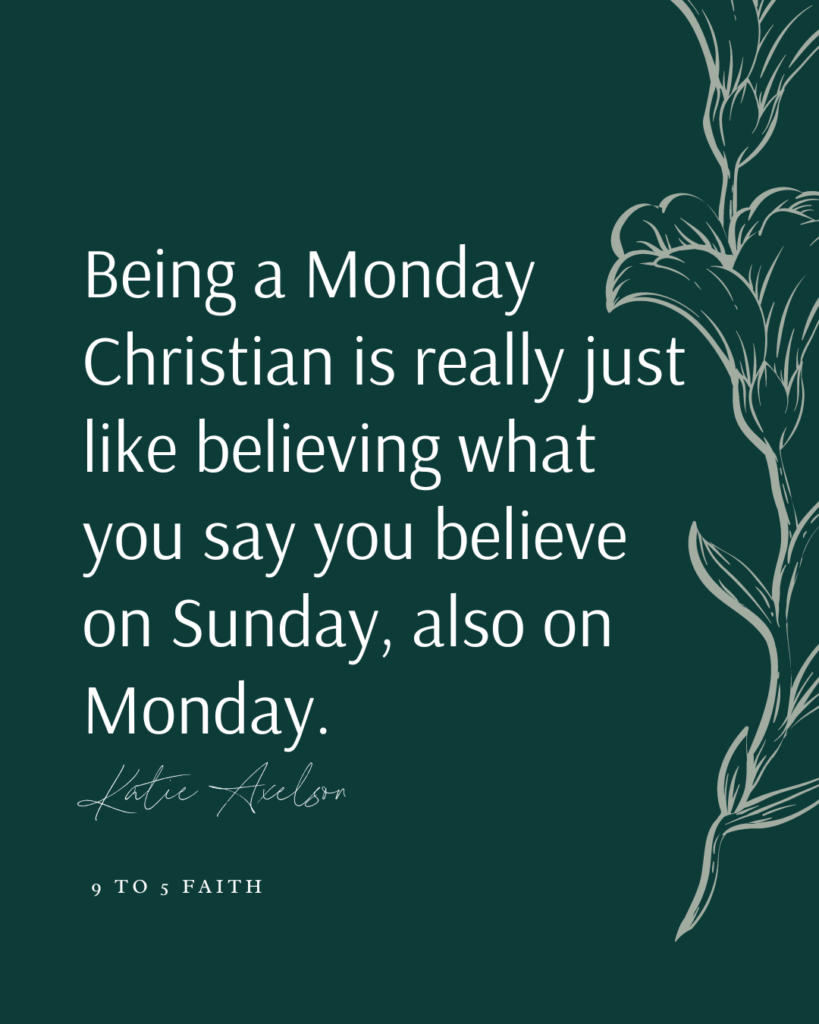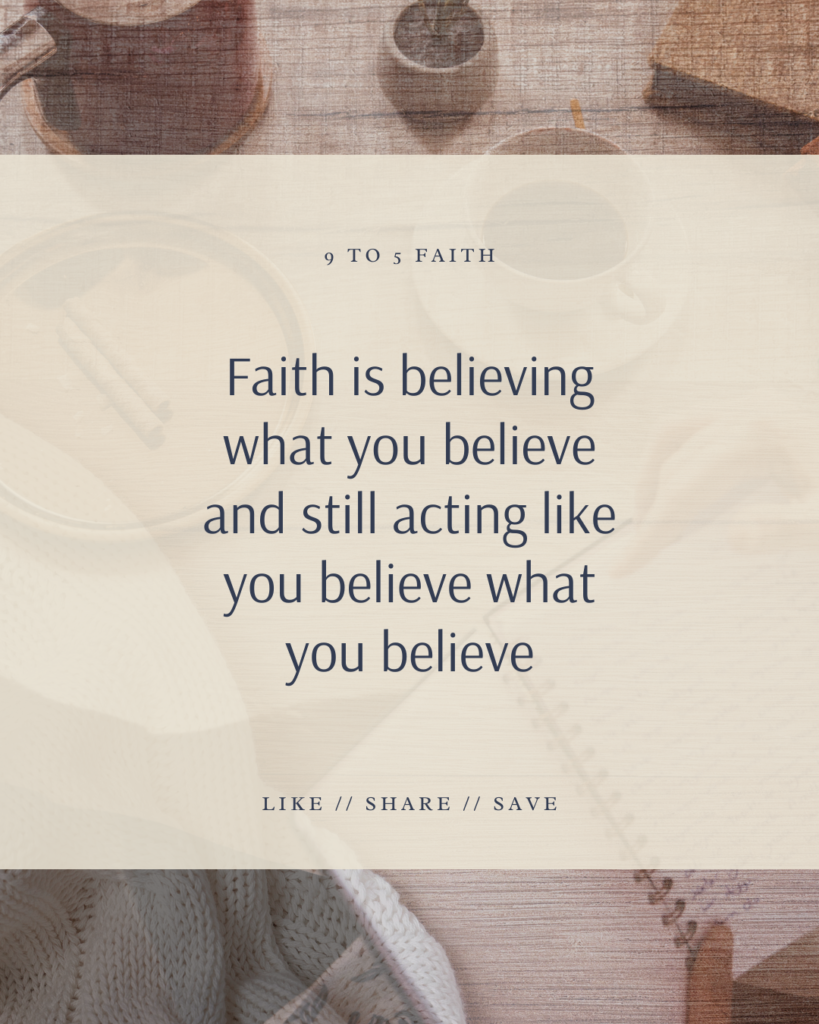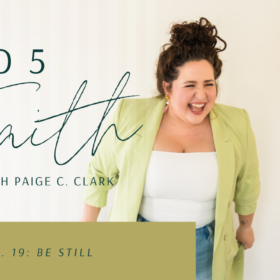This is a transcript from episode 20 of the 9 to 5 Faith Podcast with Paige C. Clark.
Share on Social




Start of Podcast
Paige C. Clark 00:39
Hello, Hello everyone. Welcome to another episode of Nine to five faith. I’m here with my friend Katie Axelson, Axel-son. How am I saying that right? Yeah, you got it. Axelson is it’s a little bit of a teaser with an L right next to an S.
Katie Axelson 00:55
Like you just don’t expect it. A lot of people flip it, and they say Alex, and that’s wrong.
Paige C. Clark 00:59
No, I saw you got the x right. That’s Axel. Yes. How are you doing today?
Katie Axelson 01:04
I’m doing well. Thanks. How are you?
Paige C. Clark 01:06
Good, doing good. Besides, you know, having that timely coughing attack, it’s okay.
Katie Axelson 01:14
Always right when it matters.
Paige C. Clark 01:16
Exactly. It’s like when the waiter comes up, and they’re like, asks you how your food is, and you’re like a mid-bite. But yeah, like, as I worked once upon a time doing service for food. And yeah, it’s definitely difficult to, like, time that perfectly because the tables always take up.
Katie Axelson 01:35
Well, which is a good thing. You want them to be eating their food. That is true.
Paige C. Clark 01:39
And it’s true, whether they
Katie Axelson 01:40
like a conversation, like
Paige C. Clark 01:41
quiet dinner as a good dinner because you know everyone’s going to be eating. That’s true. So tell us a little bit about yourself. Yeah, so
Katie Axelson 01:49
my name is Katie Axelsson. I’m in my mid-30s. I’m single; I just moved to Austin, Texas. So my day job is in digital content. So basically, like website organization stuff, I host have Hopewell travel podcast, which is a podcast designed to create space for others to share their perspectives and their stories. So we can make the world a smaller place. Just like when we travel, we get to know people who are different than we are. And we understand things a little bit differently. So we stand with people instead of having opinions on issues.
Paige C. Clark 02:15
Yeah, I love that it makes the world a smaller place. Oh, that’s beautiful. And you’re sitting with a fellow like Digital Marketer person over here. So we are in good company. I love anything. Phil. So you just moved to Austin from where? Minneapolis, Minnesota. That is quite the job.
Katie Axelson 02:34
It is quite the jump, especially to do it in June. Yeah. Because Minneapolis is just starting to get gorgeous in June, and Austin is not getting gorgeous in June.
Paige C. Clark 02:43
Yeah. Yeah, I’m in Arizona, and it is stinky hot outside. But Texas is also humid. So
Katie Axelson 02:51
yeah, I went on; I had to check my mail in the middle of the day today. And it was actually gorgeous. It was like 89, And I was like, this is a perfect day. So all of my outside projects. I was like, Oh, I’m doing them right now.
Paige C. Clark 03:04
That’s perfect.
Katie Axelson 03:05
It’s gonna get to like 105. But yeah, that’s fine. It was perfect.
Paige C. Clark 03:08
Like 113 Here. No big deal is yeah, we are. So why did you move? That’s such a significant move. Yeah. So I moved for work. Okay. Okay. So is this a new job or just like relocating out of, like, kind of convenience for the work
Katie Axelson 03:25
relocating on convenience for the work? I, I was working remotely for a while, and then it just makes more sense for me to work hybrid.
Paige C. Clark 03:31
Gotcha, gotcha. And so kind of tell me a little bit about, like, what you do?
Katie Axelson 03:41
That’s a great question, um, that I don’t have an easy answer for. I like kind of in the project manager realm of digital content. So basically, my job is to make sure that we are doing what we say we’re going to do. And the type that we say we’re going to do it. And so it’s a lot of tracking people down, a lot of following up, a lot of, like, resetting. Hey, we said we have this for you today. We’re gonna have it for you tomorrow. We’re on it, you know? Yeah, those types of things. And so making sure I’m organizing communication. All right. Do you work for
Paige C. Clark 04:13
an agency? I do not know you work in-house, huh? Wow. The way you’re talking about it is like, I bet she worked for an agency. I’m
Katie Axelson 04:21
wrong. You work. I am one of the few house yeah, I’m one of the few house people. I’m
Paige C. Clark 04:25
an in-house person too. So for those who are not familiar, you can either contract out your work to an agency or you can do it in-house; sometimes, it’s a hybrid depending on the size of the company. But I’m an in-house person where I’m like I like to have one client focus on one brand, one voice, and all that good stuff. Exactly. Exactly. So project manager, which means, yeah, Ultra organized as well.
Katie Axelson 04:53
I think that’s the thing. I was freelance for a while. I started my career freelancer, contractors as a contractor, and it was fine. Like, I enjoyed that. But I also found that it was really hard to manage what I was writing at the time, the different voices between the different organizations. So like, I had one university that was very professional, very formal. And they actually gave me a desk that I showed up to. So it was very professional, very organized; here we are. And then I had one Christian organization that was very loose, like pretty, extremely loose within the Christian realm, like, let’s not get wild here. And I had a really hard time switching between those two voices, especially as I was, like, splitting my days, half day, or whatever. And I didn’t have an office to show up to. That was for the more loose organization. And I was like, Whoa, this is a trick for my brain. I figured out how to do it, but it was difficult. Yeah. And I would prefer to be in the house.
Paige C. Clark 05:45
right? Yeah, it’s definitely there’s definitely those I did a stint at an agency. And my boss slash, like, the owner of the agency was like, I hate. I would hate to work on the same thing every day. And I’m like, I love it. I love it. I’m a creature of habit. I love to work on the same things. Not because it’s redundant, but also it just I think, like, you know, you can really hone your craft and like, when you work in a house, like hone your voice, like really get to know your voice.
Katie Axelson 06:16
Yeah. So I always, and you know, like, this is how we did it five years ago. So we did it. 10 years ago. This is how we’re doing it now. Like you’ve been part of that journey. Yeah, all the way through, which is the benefit when you’ve been with a company for a while, versus a contractor is just coming to me like, Hey, this is great. And you’re like, No, we can’t do that we’ve already done.
Paige C. Clark 06:30
Yeah, yeah, for sure. It’s funny. My husband was just like proofreading, like a website page that I had built for myself. And he’s like, it sounds a little informal. But that sounds like you. And I was like, Oh, good. Like, that’s like what I want to come to work.
Katie Axelson 06:43
Yeah. So
Paige C. Clark 06:45
where in your faith journey? Did you like it? Or where in your work history? Did you find your faith journey?
Katie Axelson 06:55
Ooh, that’s a good one. So I started my career freelance, and I was mostly working for Christian organizations. So it’s always been part of my faith journey. Or my faith in my work? I’ve always been together, right? Um, I lived abroad as a missionary for a year, and I came home when I took my first secular job. And I, like, hadn’t switched my brain. And so very right away in my first introductory email, I was like, I love Jesus. And everyone was like, Whoa, that was like things Katie did ten years ago that she wouldn’t do again. It was fine. It was respectful, but everyone was respectful about it. But it still was a little bit more forward than I think they were prepared for. I’m kind of a what you see is What You Get kind of woman’s story. Right. So it’s always been part of my journey. And I’ve never really known, like, what that would look like, especially now working in a secular company, where I can’t talk about Jesus all the time. I can’t go on mission trips with coworkers like things like that just don’t happen. But I found that there’s still space to make it worshipful to like, honor the Lord in my work, do what He has called me to do, and be in the place where he’s called me to be. And the reality is, I get to spend 40 hours a week with people who are probably not ever going to step into a church. And I don’t want to speak that over them. And I have to hear that they have stepped into a church, but they spend 40 hours a week with me. I like Holy Spirit lives in me. And so here we are, and I get to pastor them in some ways through their hard seasons. And if nothing else, if they if we end our time together, and they’re like Katie was nice, I enjoyed working with her. I’m fine with that. But if they’re like, something’s different about Katie, and I want to know more about that, that differences, Jesus, let’s talk about it. Or, like, heaven forbid, they end up in some sort of a crisis, and they don’t know what to do. But they know that I’m pretty level-headed. And then, I will know the resources. Maybe they call me, you know, and maybe I can minister to them at that moment. Or maybe I can minister to them just on a hard day when they’re not feeling well. But I’m getting ahead of myself. We’ll talk about that later.
Paige C. Clark 08:57
I love that, though. And I totally resonate with the whole, like, I love Jesus because I got a job offer one time at a secular company. And like my instinct was like, Oh, let me take the weekend to pray about that. Like, that’s how I wanted to answer, and I was like, Paige, like, they don’t understand what that means. Like, they don’t speak that language. And so I like had to, like, now that I’m married, it’s like a really good kind of like crutch or like, let me talk to my husband about it. But like, really, I’m like, no, let me also talk to Jesus about it.
Katie Axelson 09:32
Right? Yeah. I will just say like, Let me think about it. And it thinks it is prayer. Yeah.
Paige C. Clark 09:40
I love it. I love it. So what’s the most significant difference? Besides kind of working as a contractor versus in-house, but like for a Christian company versus a secular company? What is the most like Standing meaning like most in your face difference?
Katie Axelson 10:08
Somebody is going to cancel me for saying this. I actually think that, at least in my experience, my secular company does church better than my Christian companies. And what I mean by that is my secular company is very welcoming. They are very respectful of my I love Jesus, just like they’re very respectful of everyone else. And it’s a space where you can bring all of who you are to work. And in a Christian space, you can’t always bring all of who you are to work because there are some aspects of people that aren’t welcome in Christian churches, and I’m not even talking about, like, the extreme or like the political things like I know people who are divorced who feel unwelcome in a Christian organization. Yeah. And so being able to bring all of who I am has been so like, refreshing, and to be so respectful, and to be so like, willing to help. When I was moving from Minneapolis to Austin, I needed help with my house, but I actually didn’t. I mean, I did eventually go to my church friends. But I started with going to the team who was in Minneapolis; I was like, hey, coworkers, I need your help with this, this and this, and this, or I need to borrow somebody’s truck or saw or whatever. And they were all willing to provide it because that’s just kind of the community that we have as a company.
Paige C. Clark 11:25
Yeah. That’s interesting, too. And, like, I wasn’t expecting that answer. Because I think it also, like, it says a lot about, like, the company culture, also, as I would maybe argue to say, like, I don’t even know the company that you work for. But you can tell people who are more either religious or faith-based in some regard how they run their company is different than those who don’t. So like, you see that trickle down, to kind of create that atmosphere of belonging and acceptance. But I’d also say, like, that’s a rare experience where your Christian faith is more accepted because I will say, I’ve worked in the tech space for a long time. And that is not the case. Ballmer, so, but I am pleasantly hearing that that is the case for you, which is awesome to hear.
Katie Axelson 12:25
Yeah. I really enjoy it. And I think about, like, one of my bosses at a Christian organization. I had been traveling for work that weekend. And she’s like, Did you share the gospel with the person sitting next to you on the plane? I was like, No, I took a nap. Like, I don’t want to talk to the person sitting next to me on the plane. And just there was that, like, pressure and obligation? I’m not even working right now. I am on a plane. Right. And so there was none of that with my secular company. They’re like, Do you have a good nap on the plane? I was like, Yes, I did. And they’re like, by the way, I sent you an email while you’re on the plane, but you can get to when you get to. And I was like, thanks.
Paige C. Clark 12:58
Yeah, yeah, I think like, again, it. It does allow for a level of human humaneness. When when you do find yourself kind of in a secular company. Because as we were just briefly chatting, right before this episode, we were saying, like, you know, this perspective isn’t talked about. And like, I think that is because a lot of what we hear in Christian culture is from the pulpit, and people who, I mean, nine times out of 10, I don’t want to speak for every Christian church in America, but nine times out of 10. That’s their only job is to do the pastor thing and to do the ministry thing, which is great, but also, the rest of us don’t.
Katie Axelson 13:48
Right, right. And I think that, in some ways, it needs to be their only job because it is more than a full-time job. Like the pastors that I know are working 68 hours a week, there’s no possible way you’re gonna be able to, Yeah, vocational, but at the same time, like we need somebody who understands the workplace, to help us actually implement what we believe on Monday morning, like having a Monday morning faith, which is why I absolutely love your show, to be able to bridge that gap and to step in between the two.
Paige C. Clark 14:14
Yeah, and I think even just like the language that we speak is different, like, like you were just saying with like the playing experience, like someone saying, like, oh, did you talk to the person about the gospel like next to you like that conversation? While it’s important? I think that those of us who kind of work in maybe a secular workplace, not that it’s not a priority, but I think it’s a really big shift in our approach to sharing the gospel. We’re like people who work full-time in ministry. It’s like you can kind of get away with, like, being like Jesus, right?
Katie Axelson 14:54
For work. I’m a pastor. Oh, hey, let me tell you about Jesus. Right,
Paige C. Clark 14:57
like it’s, it’s an easier jump there. Versus, like, the language that we talk in the secular workplace is more so walking alongside people versus, you know, just kind of preaching at them,
Katie Axelson 15:12
I guess. Yeah, it’s all relational. Yeah, that’s, that’s where it is. It’s the people that I am spending 40 hours a week or more with day in and day out. Do I know what their kids are doing? Do I? Or do I know their kids’ names? Do I know that they go to their sporting events? Do I know about their spouse, like, it’s actually investing in them and then covering for them when they’ve had some sort of situation where they can’t do their work? It’s like; I can help with that because your kid is sick. Do you know? Yeah. My examples are about families. I have single coworkers, too, that I support.
Paige C. Clark 15:41
That’s okay. That’s okay. I just thought that the other day that I was like, Oh my gosh, I’m pretty sure every single one of my coworkers, besides kind of the one who came over with me to the job, like, have kids and are like, either married or divorced or some situation like that. I’m like, Ooh, this is like really foreign. I am a dink. I am classified as a dink nice familiar with Yes.
Katie Axelson 16:04
dual income, no kids. Yes, my friends,
Paige C. Clark 16:07
when they come over, when I had a few friends who were single, and they came over, and they looked at my fridge, my fridge of all things, and goes, Oh, my gosh, that’s a dual income fridge. Like, I don’t know what that means. But okay, like, Yeah, apparently, a dual-income fridge is definitely a
Katie Axelson 16:26
thing. But it’s a nicer fridge with different stuff in it. Yes.
Paige C. Clark 16:31
And I mean, you also brought up a good point of, like, the demographics of people you work with are probably significantly different than those you see in ministry. Because I would, I mean, I don’t have stats to I’m sure there are statistics out there somewhere that I would argue to say, to stereotype the crap out of people excuse my language, but I say crap. To stereotype the crap out of people is, I would argue to say most people in ministry are married with kids.
Katie Axelson 17:07
Yeah, I would stereotype that too. Yeah.
Paige C. Clark 17:11
And so what you’re saying too, though, is like, not only are the people you’re working with outside of that stereotype but also, like, the way you minister to them is different. Right? Yeah. So what does that look like to you? I like to like to take my listeners through, like, a journey of, like, what your day a day in the life. Sure, that is what Kati looks like.
Katie Axelson 17:35
Yeah. So I would say every day is a little bit different. Because of just the nature of my work, no two days are ever the same. But generally, as a general guideline, I work remotely two days a week, and I work in the office three days a week. So it’s a balance of, like, getting my work done at home, but then also making sure that I’ve got relationships with my coworkers and getting the work done in the office. So I get up in the morning. And one of the disciplines that I’m not very good at, but I like to practice is from six until 730 In the morning, and at night, is no technology time. So I put my phone in the drawer of my bedside table so that I don’t see it first thing when I wake up, I do sleep with my Apple Watch on and so if there’s anything like emergency text messages, I will see those on my watch, and then can decide if it needs to be handled immediately. Or if it can wait until 730. Right. Um, so I see my text messages, but I try not to like to do anything with them. And so, like, Get up, get ready, like everyone else does. Try to spend some time with the Lord first thing in the morning. Now being in Austin, I’m learning that if I’m doing anything outside, that has to also happen first thing in the morning, and that’s making first thing in the morning very full. So kind of figuring out rearranging as needed there. And then I go to work, and I work all day. And then from six to 730 again at night, no more technology. And so, during that time, I tried to do something manually. I have heard the idea that if you work with your mind, rest with your hands; if you work with your hands, rest with your mind, and I work with my mind. And so I need to do things with my hands. Moving has had a great opportunity for that because I’m like, do I can paint this small so I can hang those pictures? I can do this, that, and the other thing, but sometimes means, something manual is just chopping vegetables, like something physical with my body or with my hands. In Minneapolis, I like to go for a walk during that time. You can’t do that here in Austin. That is the heat of the day. Do you not go for a walk from six to 730? No, but that was my favorite end-of-the-day activity. Yeah. And so just something to get me again away from the technology, away from the screen. I’m on a screen all day, sometimes multiple screens.
Paige C. Clark 19:44
As I get here with my iPad, my laptop, and my other laptop
Katie Axelson 19:47
on I have two computers, an external monitor, and a phone all on this desk right now. So yeah, I get it. I’m so stepping away from the screens. Like yeah, have that time away. And if I’m not feeling up to doing something manually, maybe I’ll read a book. During that time, I was just something a little bit different. That is away from the screens. And again, I’m not great at this. So don’t hear me saying I am an expert at this. But it’s a discipline. And it’s a discipline that I try to practice. And sometimes I’ll run errands during that time, or if there’s something that I’ve really been dreading, that’s not a screen project. That’s what I’d have to get on.
Paige C. Clark 20:25
And then, like timeframe, though, like six to 730, both in the morning and night. So you hear some people who are like, Oh, I do like, you know, just in the morning or just at night. And I like, though, like, anytime that falls between six and 730 is no.
Katie Axelson 20:45
I heard of a town, and I don’t know if this is true. I haven’t fact-checked us out on the internet. That’s really not true. But it inspired me. Apparently, this entire small town, I think, I want to say it was in Canada, but that might, it might have just been a Canadian individual that I heard it from. So maybe it wasn’t because the power is shut off in their town from six from seven to 830. And so, like, there’s just no screens from 7030. And so I tried that first, I was like, oh, seven 830. That seems to make sense. Except I also tried to wrap up whatever I was doing for the night at nine, so 830 to nine-time just wasn’t working for me. Right? And so that’s when I moved it earlier. And it’s closer to right after work, obviously. Do I leave work at five o’clock every single day? No. But if I hadn’t left work at six yet? Do I really need to stay? Or is it time for me to go? Yeah, so I have that discipline to have, like, Hey, I actually have to get out of the office at this point. Obviously, emergency, life happens, right? So it needs to happen, too. So it’s not a, not a law, right? Just a guideline rule. And so it’s a good time to be like, Oh, hey, it’s six o’clock, I need to go home. And so that’s why that time has worked. And then it’s if I do leave at five or 530, or whenever I leave, it’s a good chance to decompress from the day and to not jump straight into like my own podcast project, or things like that, because I could go straight from my work computer to my personal computer all night and just be fine with it. Yeah, and that is not good for my mental health. And I will feel the effects of that shortly thereafter. Yeah. So then six or 730 made more sense for me because then I can use it from 730 to nine-ish when I try to wrap up for the night to do my own podcasting stuff to catch up on emails and things like that. Sometimes my computer doesn’t get out again, like your email, for example, I saw it today it came in, but I just didn’t get responded to for a couple of days. All right, because I was trying not to be on my technology, and I was like, I will get back to the page; it’s just not gonna be immediate. And then, from nine to 10, I’m not as strict with the no technology thing, but it’s just better for your sleep hygiene if you’re not gone before bed. And so I tried to like read or spend that time with the Lord. But most of the time, from nine to 10 am, wrapping up whatever loose ends I have on the day. So not super disciplined about that one. But, um, that’s the goal. And then, in that time, at the end of the day, I tried to reflect on the day, and in different seasons, I need to reflect differently on that. So there was one year for Lent, I took the fruit of the Spirit, you know, love, joy, peace, patience, kindness, gentleness, all of those. And I wrote them out. Every single day I listed How did I see an example of faithfulness today? How did I see an example of joy today? Be it in my own life? Or in someone else’s life? How do they see an example of self-control today? Just those types of things. And sometimes, self-control is my sister had the opportunity to push my cousin in the pool, and she declined. You know what I mean? Like that’s still self-control. And so I still like to see an example of it. So some days, I go through all of them; that can be a project, right? So most days, I just go through what my word is for the year. So my work for this year has been generous. And so I look at, okay, where did I see an example of generosity today? The example of generosity I saw today was that somebody paid for my lunch. That was generous, that was unnecessary and generous, and I really appreciate it. So that’s where I got to see generosity today.
Paige C. Clark 24:04
I love that. I love that. And I think, too, like I always find that my mind starts just like reeling and going in like hyperdrive at night. Especially like I’ll start, I like to pray myself to sleep. I don’t know if this is a common thing. But I pray myself to sleep almost every night. But I’ll find myself like my brain will be like this if you I’m a hand talker, Italian, but like my brain will be on one path and then I’ll just kind of veer off and like go in the different direction. And so like just that discipline of like kind of emptying your brain at night, and it has shown to be like really helpful. Yeah. I love hearing. Yes. So how do you make sure that you fit in that one-on-one time with God?
Katie Axelson 24:56
That is a good question. And I think the answer depends on the day. Aaron viciously the like, good churchy answer if, like, you make it a priority. And that’s true, but at the same time, you make it a priority, and you fit it where it fits. Yeah, there was a season of life when I didn’t have that time in the morning or at night. It just wasn’t feasible because of the other situations in my life. But I had our lunch break. And so I would spend 2030 minutes eating with my coworkers, whatever, building relationships with them. But then I would spend the other 30 minutes off quiet somewhere reading or praying, or whatever it was in whatever quiet space I could find, which could be the elevator or like a back hallway, or like, wherever. I had people regularly be like, Why are you back here? And it’d be like, because I just needed some alone time because I’m an introvert, and y’all are a lot. And they’d be fair, you know? Yeah, and no, no one ever questioned that as long as I was where I was legally allowed to be there, like, Oh, that makes sense. Yeah. I, because otherwise, people are gonna ask me more questions. When I’m on lunch right now,
Paige C. Clark 26:00
I would always do hard naps. Although it’s hard to do in the summer, you just run by air conditioning and pay for gas later, car naps. And then, like, the time I was in the office, I would take desk naps, if my coworkers were, like, not around, like crawling or my desk and like take a nap. That was
Katie Axelson 26:20
people who have office doors have a luxury in that regard. Because they can just close the door or the blinds or whatever. And just like turning off the lights.
Paige C. Clark 26:28
Take a snooze. It’s true. I mean, I had a cube. So I would even do it there.
Katie Axelson 26:34
That’s it. They haven’t told that at a cure.
Paige C. Clark 26:35
Or if you have meeting rooms. My sister, my nephew, was trying to call me to ask if you have meeting rooms, and you book a meeting room, and then just like, shut the door and turn off the lights in the meeting room. It’s a good idea. Definitely done that before. Just yeah, have a little decompression time, have a little quiet time. Yeah. Yeah, for sure.
Katie Axelson 27:02
I kind of just figure out where my coworkers are and be somewhere where they are not.
Paige C. Clark 27:06
That’s valid, I think, I think too, and it like depends on the workspace and that you’re like, working in and like being surrounded by like, the types of people like are they all introverted? Or are they like, I mean, it’s marketing. So most people are extroverted,
Katie Axelson 27:22
you’re all extroverted, and they’re all creative. And they all drain me at the end of the day. I love them. Yeah, they are my people. But I need to get away from them. Sometimes,
Paige C. Clark 27:31
yes, I’m definitely, like, an ambivert, where I’m like, 5050, where I’m like, I can like, nerd out and like, go like so extroverted. But also, at the end of the day, I’m exhausted, and I need like 15 minutes of quiet time,
Katie Axelson 27:48
I need a mix of both. This is why I try not to take my work-from-home days consecutively. Because I need to not be by myself for too many days in a row, but also not to be with people too many days in a row. So the hybrid work schedule is perfect for me.
Paige C. Clark 28:01
That is awesome. That is awesome. That is like you have that level of self-awareness. Yeah, it works. So how long have you been in Austin now? Like, a month, a month? Awesome. Um, and I mean, I’ll ask this question. But I also like asking you and knowing that, like, you are probably still like very much getting settled in. But, like, Have you been able to find a church where you’re at? Like, have you been able to, like, get connected in that community? And, like, what is that looking like for you right now in this season? Yeah,
Katie Axelson 28:31
great question. So this exact season, I’m church shopping, which no one likes. Right, right. It’s the worst part about moving. I don’t know if that’s true. There are a lot of worst parts about moving. But it is still a discipline to make sure that I am showing up to church every week. One of the churches in the Minneapolis area is called Creative church and has this thing. Called they call the three-visit challenge, where they encourage you to visit the church three times before you make your decision on if you’re going to attend that church. They don’t need to be three consecutive weeks, I don’t think, but like the theory is, if you go once and there’s a guest pastor, you don’t really know what the church is like, right? If you go, like, maybe it’s a fundraiser weekend or something different is happening this weekend, like, free gives you a good feel for what the church is like. And so I’m trying to take a three-visit challenge with churches that I’m seeing. Sometimes I know right away, hey, this isn’t gonna be it. But sometimes I’m like, Okay, this was this wasn’t okay, church. Let’s try it again. And so, I did a three-visit challenge with the church and wasn’t thrilled with it. So we’re back to square one of starting over, but it took three visits for me to decide, visit one, I was like, it’s a five out of 10. Is it two? I was like, oh, it’s an eight out of 10. I like that and visit three. I was like, nope, three out of 10. We’re done.
Paige C. Clark 29:48
Goodbye. And then, you know, a lot of that comes with like discernment and you know, understanding like there is a very large church out by me and I did not need to go more And then once to decide like, yeah, pastors should probably not be preaching solely from the message. Like, that’s just true. You know, my opinion on that. But one thing that like I will say is not necessarily that, like, the pastor always needs to be on point every time. But when my husband and I were trying to find a church kind of like out here, we’re in the east valley. I just watched a bunch of sermons online from a bunch of different pastors. And I was like if it doesn’t, like, not necessarily at the message connects, but the way that it’s delivered and their speaking style and their teaching style, if it doesn’t land and it doesn’t connect, I’m like, that’s going to be a no for me.
Katie Axelson 30:47
Yeah. That is one of the beauties of the internet is that you get a chance to explore different churches. I always have to be careful because I’m like, Oh, I went to church online as it counts. Oh, yeah. Does it count? First of all, what are we counting? Second of all, like, your Church Online is not going to bring you a meal when you’re quarantined with COVID? Like, yeah, that’s an old example now. But yeah, it’s still the reality of, like, they’re not going to be there for you when you need them. Or just Sure. Making sure that you’re also going. Oh, yeah. So like, there are a couple of churches that I visited online before I moved, obviously, and yes, moving, that I’m like, I don’t need to visit that one in person. But there are people that I was like, oh, I should visit this one in person once I get
Paige C. Clark 31:24
there. Yeah, yeah, for sure. I completely agree. When I was shopping, I would like, take a day and just like, find all these different sermons from all these different churches and just watch them and be like, Okay, maybe this is one that we want to, like, go and visit and everything like that. And I think, too, it just depends on, like, teaching style and all that stuff. So right. Now,
Katie Axelson 31:45
I’ll also say like, I’m very comfortable in most churches; I can do high church, I can do low church, I can do it all. But I’m not truly. What does that mean? How high would the church be, like, more formal? Okay, church, I call, like, Robe kind of churches, more of your typical nondenominational church.
Paige C. Clark 32:02
I heard it put like that before. That’s why I had to stop you. Oh, no worries. Fascinating.
Katie Axelson 32:06
Yeah. So I’m comfortable in the more traditional churches, the less traditional churches, I’m comfortable in all of them. But I’m truly at home and very few churches. And so knowing that about myself, I’m like, well, I’ll just go where I’m invited. And so that’s how the church that I visited got three visits because a coworker invited me, and then a different coworker invited me to that same church, which I will say was the coolest thing. Getting to worship with my coworkers is an experience that I have never had before. Especially my secular college secular company. Yeah. And so to realize, okay, first of all, there are other Christians here a second of all, like, they know that I’m a Christian. And so they invited me to church. And now, here we are in this pew. And then there they are on Monday, Tuesday, Wednesday, whatever day I see them, like, is the coolest thing. And so, in some ways, that’s one of my priorities right now is like, okay, if I’m comfortable in most churches, how do I find a church where there are some coworkers that I can be worshiping with every week?
Paige C. Clark 32:59
Yeah, yeah, that’s really cool. And I think too, like, like, for me instantly. I’m, like, not close with my coworkers. Like, it just like made me kind of clam up a little bit at that thought because I’m like, oh, that’s like a very, almost like, intimate way to get to know your coworkers is to worship alongside. It is. Yeah, it is. So that is a risk, but also, like, again, it’s a high reward because then you are familiar with the types of people that you’re working alongside. And, you know, they kind of are raising their hand, and you can raise it back.
Katie Axelson 33:36
Exactly. Give him my five. Or you can make it awkward.
Paige C. Clark 33:41
So you mentioned something earlier that I want to go back to, and it was this idea of having a Monday faith and being a Monday Christian. Yeah, I care more about that.
Katie Axelson 33:54
Yeah. So being a Monday Christian is really just like believing what you say you believe on Sunday, also on Monday. And so it looks like your faith is showing up in your workplace. And it doesn’t need to be flamboyant and outgoing, and you don’t need to be sharing the gospel with the person sitting next to you on the airplane. I think we’ve already established that’s not my cup of tea. But it does look like still believing it on Monday. And so sometimes that looks like being like I can’t be part of that project because It doesn’t align with my values. I can’t be part of that project because it doesn’t align with my ethics. I would rather you ever.
Paige C. Clark 34:29
Yeah. And that. Yeah. Yeah, rally. Okay, I didn’t mean to cut you off because
Katie Axelson 34:37
I was fine. It’s fine. I can’t go into too many details about how I did it or what I did, but I do have to stand up for what I believe in that way.
Paige C. Clark 34:43
That’s amazing. Okay, keep going. Yeah, fascinated.
Katie Axelson 34:47
That’s okay. Um, so, yeah, just still believing what you believe and still acting like you believe what you believe and what that looks like and how you carry yourself, how you talk about your coworkers, how you talk to your coworkers. Um, do you believe in them? Do you believe in them doing their jobs? Well, can you support and encourage them? Even when it might be difficult? Like even when they got that promotion that you really wanted? Are you going to be the first person to congratulate them? Or are you going to give them a high five? Are you going to pray for them, whether they know it or not? I have been able to pray for coworkers at work, coworkers who don’t even believe what I believe. So, for example, one of my Jewish coworkers wasn’t feeling well. And he knew I was a Christian. I knew he was Jewish. But I still was like, Hey, would it be okay if I prayed for you? And he was like, Yeah, sure. And we didn’t have private space to have gone to, to pray. So I just asked him a lot of questions. And then I thought, Okay, well, what’s the common ground of our faith here? The common ground of our faith here is Yahweh God. So I just prayed to God to heal him. Yeah, you know, and I, Jesus, is the difference in our faith. And so I didn’t bring up Jesus in that in that particular conversation. While, of course, that is also who I’m praying to. I focused on the commonalities of our faith. Yeah, we just asked God to heal him. Amen. You know, and he did still end up going home sick that day, but he made it a lot further into the day than we thought he would. And so just being able to see moments like that is like, everyone knows that I’m a Christian. So sometimes faith questions just come up in the course of life. Yeah. And I’ve been the resource that they’re comfortable coming to. Yeah. And then it also looks like learning from them. There have been plenty of I don’t want to make this a polarized conversation here. But planning hasn’t been controversial over the last several years. Yeah. Especially living in Minneapolis. Right? Yeah. Which is where George Floyd was murdered. So like to be able to hear all these Christians saying, well, all lives matter. Why do you just say black lives matter? But then to actually sit down with someone to say, okay, yeah, all lives do matter. But it’s the black lives that we’re risking right now. And so, what does it look like to actually support our friends of color? Our black friends are whatever term that they prefer friends to support them in that, and I was like, Oh my gosh, like, I hadn’t thought about it that way. And so it’s the chance to sit down and actually learn from them. Which is actually where my podcast came out. And, um, the shameless plug was from a conversation like that. Yeah, it happened to be with a Jewish coworker about what it was like to be Jewish at Christmas time. And so I was like, Oh, my gosh, like, people need to hear this. Will you come to my show? I had just as a baby podcast. I did like three episodes yet. So I don’t even know what it was about. I was like; it’s about Jesus. Well, no, apparently, it’s not. I mean, it is, but it’s not. Yeah. And so I brought her on the show and was like, hey, talk about what it’s like to be Jewish at Christmas time in the month of December? How can we be respectful of your faith while art is right in your face, right? And so it’s made me more conscious and more aware of that. And now, almost 100 episodes later, we’ve talked to a lot of different people about how we can be more supportive of their perspective of their life story. And we’re not afraid to talk about the hard things. And I think that’s where it comes from. What does it look like to actually listen? Yeah. And there have been times in the show where I’ve wanted to contradict somebody because I don’t believe what they’ve said, or I feel like what they said is, is heretical or not supportive of Jesus, but I’ve had to sit there and go, Okay, I asked them to come on my show to share their perspective, I can’t ask them to come on my show to share their perspective and then tell them they’re wrong. They’re disrespectful. Yeah. So I just have to roll with it. And try to find, again, the common ground. So if somebody has said something that I don’t believe, I don’t believe 90% of it. But if I do follow the 10%, I will latch on to that 10%. And I will acknowledge, like, what they have said that I do actually believe and reinforce that. And then sometimes let the rest of it either roll off or be like, Oh, I have to think about that. So it’s I don’t want to say the show is the same way. I live my life. But it’s a very, like, similar mentality.
Paige C. Clark 38:49
Yeah, yeah. I was gonna say, like, it’s talking about your mindset that is kind of reflected in what you do in the podcast. Yeah. So in all of that, how do you cling to capital T, truth, and all of that, because I hear what you’re saying of like, okay, let’s find common ground and all that stuff. But at that, like, this is just like my own internal, like dissonance going on of like, okay, but there is absolute truth. And that’s not to say we shouldn’t hear the stories of those people. But how can we hear them and also proclaim absolute truth at the same time? Yeah.
Katie Axelson 39:33
I think it looks like admitting that we don’t know everything. And we don’t know what we don’t know. And that’s the beauty and hearing their story. So I start with listening to understand, asking questions to understand to hear their perspective. And then I take a look at, okay, what is God say? What does the Scripture say? What have I always believed? This is my interpretation of the Scripture. Like in alignment with the Scripture, I But what the Scripture has actually said? Or is it what I’ve always heard us talk about this Scripture? And sometimes I have to say, I don’t know. Like, Scripture can be interpreted in so many different ways. And I’m not saying like Unitarianism here, like, there’s one way, truth life, his name is Jesus. But also saying like, there are some things that I, people who read Scripture, interpreted differently than I do. For example, I had one of my good friends on the show who is a gay pastor. And I was like, Okay, help me understand. How do you read Scripture in alignment with what you believe in who you are? Helped me understand. And it was insightful to me, and I still have a lot of questions; there are still a lot of things that I don’t understand. But it’s not my job to tell him or anyone else that I think they’re wrong. That’s Holy Spirit’s job; I’m supposed to, like, hold myself to the standard that is true. And to love them and care for them the way that God would love and care for them. And let him handle the details of what that looks like. And that may not mean that I’m supporting everything that they’re doing. It may mean that I’m opting out, like I said earlier, like there have been work projects I’ve opted out of, and there have been social events that I’ve opted out of. Yes, I’m not supportive of that support of that. But at the same time, it’s like, well, what does it look like? What can I support? Yeah, yeah, I can support going to happy hour; I can show up at happy hour; I will not be doing three rounds of tequila shots where I’ll show up to a happy hour. Those kinds of things.
Paige C. Clark 41:22
Yeah, fair enough. Fair enough. And yeah, I think to, like, just understand, man, I just like to want to go listen to these episodes because I’m, like, so curious. I’m like, oh, what? What did this pastor say in and about everything? And because I have heard kind of the full range of arguments and everything. I think my question to you, and this is getting, like, very theological. So like, stop me; I don’t want to go down this route. But where does it cut? Like, where does the Scripture, and the only reason why I’m bringing this up is because I like it was on top of my head yesterday. So in terms of like, when Scripture tells us to rebuke our neighbors, right, like, how do you balance that with like, like, it’s not them to it’s not my place to tell them that they’re wrong when Scripture does tell us to like to rebuke people.
Katie Axelson 42:18
Yeah. So I think it takes a look at, like, what is the context of that particular rebuke? And so, like, the one that I’m thinking of, oh, I wish I had a Bible within arm’s reach. I’ve got all these technology devices. And I don’t have a Bible here. But the one I’m thinking of is the one in the gospels, where Jesus is like, take it to the person and take it to the church, take it to the community, those types of things. That’s in the context of a community that has asked for that type of accountability. Being part of a church, I’m going to hold the coworkers that I go to church with to a different standard than I do; the coworkers that I don’t go to church with, or the coworkers who don’t go to church, I’m going to hold them to a different standard, I’m going to say, hey, I don’t know if you realize you did this. But that wasn’t cool. You know, the same way, I’m going to say, Hey, I saw Jesus and you in that moment. And that was awesome; well done. Because we have that relationship because we go to church together because we share our faith, my coworkers who don’t go to church don’t share their faith; I can’t hold them to the same standard that I hold myself to because they haven’t submitted to the authority. That is Jesus.
Paige C. Clark 43:17
Right? Yeah, yeah, for sure. I was just more so curious about the conversation with, like, a pastor; I was really, I’m just gonna have to go listen to that. Because well, and not out of like, you know, drama, curiosity. But also, I think that, like, I think Christians have a habit of shying away from what we would like to call the fringe examples when really, they’re not so fringe anymore. Sure. And I think that, like, there needs to be an element of leaning into that and having those conversations. Because again, they’re not like, again, you know, there are a plethora of people who are out there who think it’s okay or not okay to have a gay pastor like what you know, like, I know what I believe, and what Scripture has, has revealed to me about that, but again, it’s not a fringe example anymore. It is very unfriending. It is very commonplace.
Katie Axelson 44:32
Yeah, it’s one of those things that we’re like, sorry, Siri on my computer’s going off. Let me make her stop. Yeah, I know. You didn’t know I didn’t want to try again. It wasn’t even talking to you. Like, as I’m church hunting, that’s one of the things that I’m being attentive to. It’s like weird. Is this church stand? Are they affirming? Are they non-affirming? How do I feel about what they are affirming? How do I feel about what they’re not affirming? How do I feel about their approach to this conversation? That is, like you mentioned, every Where do we go? Yeah, um, and just kind of weighing it with both hands and also being like, it’s not an issue that directly affects me. But how can I love and support those? Does it directly affect you? Yeah, like, what’s going to be empowering to them? Whether I agree or not is not the issue here. The issue is going to be how we love them like Jesus. Mm-hmm.
Paige C. Clark 45:21
Yeah. And I think too, like, I mean, just working in a secular environment. I think that within the church, it might seem fringe, but within a secular environment is commonplace. And so I think that is why maybe I feel that there is a little bit of a gap in regards to maybe not necessarily, necessarily how we should handle it, but or like, not what we should believe about it, but how we should handle it because I’ve run into that issue so many times. And I’ve told this story on the podcast before of like, this, this coworker of mine, was talking, or alluding to the fact that he went and did a drag show, and openly asked to kind of like a, like a group chat who wants to see pictures. And I sat there, and I’m like, Okay, I don’t know how to respond. Sure, in a way that is honoring to God. And like, what he said about Scripture, or what he has said about, you know, gender and modesty and that whole route whole different. Yeah. And I was just like, how do I hold both at the same time? And but like, also, like, not be dismissive or ugly or hurtful to my coworker? Yeah. And honestly, the answer was, don’t say anything. Sure. That was my answer was paid. You’re not gonna say anything until you have a clear direction on what to say? Yeah, I didn’t say anything in that situation. Because I didn’t know, you know, what? The proper way to respond would be to that situation. And so yeah, that’s it. Let’s happen.
Katie Axelson 47:28
Yeah, it totally does. And let’s even pull it back to a less controversial topic. Let’s think about even swearing, right? Yeah. My coworkers have had fruity language. Yeah, um, I have never asked anyone not to swear in front of me. Right. But at the same time, a lot of them will realize that I’m in the room. And they’re like, sorry, I was like, what? Why? Yeah, it’s fine. You know, I will even pull out a well-placed swear word. At the right time, you know, it gets attention. But it’s still about, like, I don’t want to live like I think I’m above them. I don’t want them to feel like they have to change who they are simply because I’m here. Right. And so, while it’s not going to be very I
Paige C. Clark 48:11
want them to change, but not because of you.
Katie Axelson 48:14
Jesus, exactly. And it’s not going to be every other word coming out of my mouth ever. Right? But at the same time, like, sometimes it’s the right word. Yeah. So what does it look like to not expect to hold them to the same standard that Jesus holds me to? Because Jesus isn’t holding them to that standard right now? Because they don’t know Jesus? If they knew Jesus, he would be holding them to that standard. And I had a coworker who was like, I’m trying to clean up my language because I just met Jesus. Can you hold me accountable? I was like, Absolutely, I can. But until he had asked me that, I had no interest in policing his words. Yeah. Yeah. I
Paige C. Clark 48:47
I think that’s a great example. And I ran into the same exact thing where she said, like, one of my coworkers said something in a meeting, and I’m like, I didn’t even think to think thoughts about. I was just like, yeah, like, okay, and then she, like, messaged me individually and was like, I’m so sorry. I’m like, Yeah, I don’t care. Do you? Like yeah, I say it to, like, write it, hey, it happens, you know, and like, I ran into that issue a lot when I was in college and realizing, like, a lot of my friends tried to hide things from me because they knew I would disapprove. And I feel like that’s a whole other conversation on friendship. But yep, you know, it happens, and it’s very commonplace, but I think too, like, it is an opportunity to set yourself apart from the rest of the world. We’re supposed to be of this world and not in this world. And you know, your coworkers will hopefully strive to have more. I’m gonna say this word, but I’m like grossed out that like I’m more moralistic behavior is the best way I can Say it. Not only around you, but it does, like, think of it, you’re spending 40 hours a week, if you spend half that time with one coworker, you know, that’s 20 hours of the week that they’ve decided to make more to make better decisions in their life that is more aligning to ultimately the gospel.
Katie Axelson 50:23
Which is awesome. Yeah, absolutely.
Paige C. Clark 50:26
Oh, Katie, I love this conversation. Any final thoughts?
Katie Axelson 50:31
Oh, goodness. Um, no, I think we’ve covered a lot of where my thoughts were; I think it’s a matter of living, living well, and loving. Well, yeah, that’s kind of what it’s all about for me. Listen, well, live well, loved well, and came up with that right now. Actually, I might not need to use that smile.
Paige C. Clark 50:45
and say it again. Listen, well, live well, loved. Well, there you go. There you go further. We are. I always like to finish off the episodes by asking my guests. What is one thing that our listeners can do this week to implement a faith-based practice to help them grow in their faith?
Katie Axelson 51:03
Yeah. So I’m going to talk about an app that I downloaded recently called one minute pause. It’s from John Eldritch, which is so great. It is like a one-minute meditation. There are also three 510-minute meditations as well. And it will send you a reminder on your phone to take your pause. You can pick the time or can do whatever you want. And so it is that reminder to, like, take a step back to reconnect with the Lord throughout the day, too. It’s literally one minute if you already have your headphones in and Your call is finished. But no one knows that. Hey, guess what? You’ve got one minute to do your pause. And to just take that second to breathe.
Paige C. Clark 51:41
Yeah, I love it. So one minute pause. Yeah, I
Katie Axelson 51:44
I think it’s just called pause. Oh, pause.
Paige C. Clark 51:46
I love that. I had a boss one time who anytime a meeting finished early. He wouldn’t say, like, okay, like, you know, back to work. You’d be like, Oh, great. You got 15 minutes, go do something fun, like, use the 15 minutes we’re already accounted for. So there’s that for the one-minute pause. If you already have your headphones, I love it. Take the pause anyways. Right. Katie, thank you so much for joining us now. Where can people find you and your podcast and hear these awesome conversations?
Katie Axelson 52:14
Yeah, absolutely. So my internet home address is Katie axelsen.com. That’s 8x e l s o n. And then Instagram, same handle Katie Axelsen. Pretty difficult. I know. I do have a Facebook Katie Axelsson writer. I don’t know how often I update that. So probably not the best way to connect with me, but it does exist. And the podcast is called have hope will travel. You can find the link to it on my Instagram on my website, or it’s on your favorite podcasting app. Episodes usually come out every other Monday but are in the process of moving, so it’s kind of like they come when it’s a situation right now.
Paige C. Clark 52:47
I love it. I love it. Thank you so much, Katie, and we’ll catch you guys next week.
Katie Axelson 52:51
Awesome. Thank you








